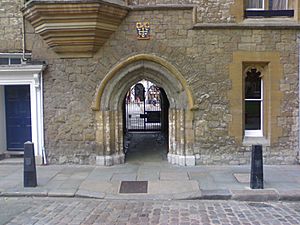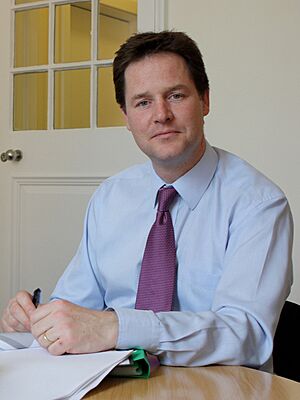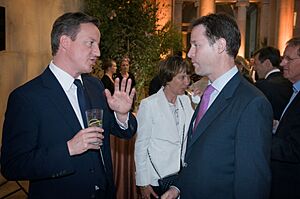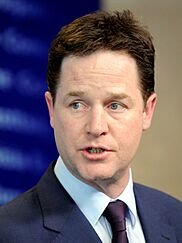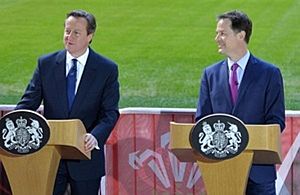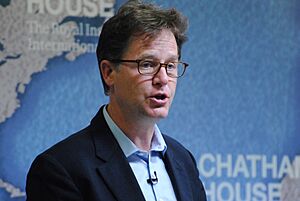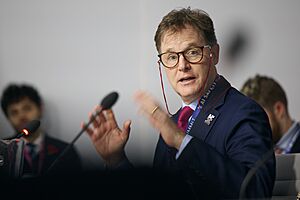Nick Clegg facts for kids
Sir Nicholas William Peter Clegg (born 7 January 1967) is a British politician who has now retired from politics. He was the Deputy Prime Minister of the United Kingdom from 2010 to 2015. He also led the Liberal Democrats political party from 2007 to 2015.
Clegg was a Member of Parliament (MP) for Sheffield Hallam from 2005 to 2017. He is known for supporting both socially liberal and economically liberal ideas.
Quick facts for kids
Sir Nick Clegg
|
|||||||||||||||||||||||||||||||||||
|---|---|---|---|---|---|---|---|---|---|---|---|---|---|---|---|---|---|---|---|---|---|---|---|---|---|---|---|---|---|---|---|---|---|---|---|
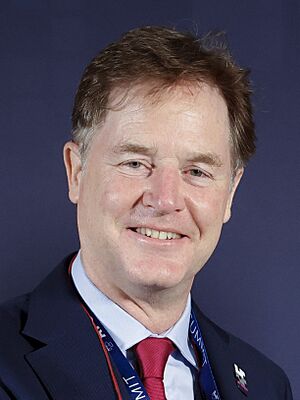
Clegg at the 2023 AI Safety Summit
|
|||||||||||||||||||||||||||||||||||
| Deputy Prime Minister of the United Kingdom | |||||||||||||||||||||||||||||||||||
| In office 11 May 2010 – 8 May 2015 |
|||||||||||||||||||||||||||||||||||
| Monarch | Elizabeth II | ||||||||||||||||||||||||||||||||||
| Prime Minister | David Cameron | ||||||||||||||||||||||||||||||||||
| Preceded by | John Prescott | ||||||||||||||||||||||||||||||||||
| Succeeded by | Dominic Raab | ||||||||||||||||||||||||||||||||||
| Lord President of the Council | |||||||||||||||||||||||||||||||||||
| In office 11 May 2010 – 8 May 2015 |
|||||||||||||||||||||||||||||||||||
| Prime Minister | David Cameron | ||||||||||||||||||||||||||||||||||
| Preceded by | Peter Mandelson | ||||||||||||||||||||||||||||||||||
| Succeeded by | Chris Grayling | ||||||||||||||||||||||||||||||||||
| Leader of the Liberal Democrats | |||||||||||||||||||||||||||||||||||
| In office 18 December 2007 – 16 July 2015 |
|||||||||||||||||||||||||||||||||||
| President | Simon Hughes Rosalind Scott Tim Farron Sal Brinton |
||||||||||||||||||||||||||||||||||
| Deputy | Vince Cable Simon Hughes Malcolm Bruce |
||||||||||||||||||||||||||||||||||
| Preceded by | Menzies Campbell | ||||||||||||||||||||||||||||||||||
| Succeeded by | Tim Farron | ||||||||||||||||||||||||||||||||||
|
|||||||||||||||||||||||||||||||||||
| Member of Parliament for Sheffield Hallam |
|||||||||||||||||||||||||||||||||||
| In office 5 May 2005 – 3 May 2017 |
|||||||||||||||||||||||||||||||||||
| Preceded by | Richard Allan | ||||||||||||||||||||||||||||||||||
| Succeeded by | Jared O'Mara | ||||||||||||||||||||||||||||||||||
| Member of the European Parliament for East Midlands |
|||||||||||||||||||||||||||||||||||
| In office 10 June 1999 – 10 June 2004 |
|||||||||||||||||||||||||||||||||||
| Preceded by | Constituency established | ||||||||||||||||||||||||||||||||||
| Succeeded by | Robert Kilroy-Silk | ||||||||||||||||||||||||||||||||||
| Personal details | |||||||||||||||||||||||||||||||||||
| Born |
Nicholas William Peter Clegg
7 January 1967 Chalfont St Giles, Buckinghamshire, England |
||||||||||||||||||||||||||||||||||
| Political party | Liberal Democrats | ||||||||||||||||||||||||||||||||||
| Spouse |
Miriam González Durántez
(m. 2000) |
||||||||||||||||||||||||||||||||||
| Children | 3 | ||||||||||||||||||||||||||||||||||
| Residences | Atherton, California, US | ||||||||||||||||||||||||||||||||||
| Education | Westminster School | ||||||||||||||||||||||||||||||||||
| Alma mater | |||||||||||||||||||||||||||||||||||
| Signature |  |
||||||||||||||||||||||||||||||||||
Born in Buckinghamshire, Clegg studied at Westminster School and then at universities in Cambridge, Minnesota, and Belgium. He worked as a journalist and later became a Member of the European Parliament (MEP) in 1999.
After becoming an MP in 2005, Clegg held several important roles in the Liberal Democrats. He became the party leader in 2007. As leader, he believed the Liberal Democrats were a "radical centrist" party. He supported lower taxes, changes to how elections work, and more focus on environmental issues.
In the 2010 general election, the Liberal Democrats won 57 seats. Since no party won a clear majority, the Conservative Party formed a coalition government with the Liberal Democrats. Clegg became the Deputy Prime Minister under David Cameron.
During his time as Deputy Prime Minister, Clegg was the first Liberal Democrat leader to answer questions in Parliament for the Prime Minister. He helped pass the Fixed-term Parliaments Act 2011, which set fixed dates for general elections. However, the Liberal Democrats faced criticism for changing their promise to oppose increases in university tuition fees.
After the 2015 general election, the Liberal Democrats won only 8 seats. Clegg then resigned as Deputy Prime Minister and party leader.
In 2016, after the UK voted to leave the European Union, Clegg became a spokesperson for the Liberal Democrats on EU matters and international trade. In the 2017 general election, he lost his seat in Sheffield Hallam. He was given the title of Knight Bachelor in 2018 for his public service.
After leaving politics, Clegg moved to the United States. In 2018, he joined Facebook, Inc. (now Meta Platforms) as a vice-president. He was promoted to president for global affairs in 2022. He announced he would leave Meta in 2025.
Contents
Early Life and Family Background
Nick Clegg was born in Chalfont St Giles, Buckinghamshire. He was the third of four children. His father, Nicholas Peter Clegg, was a chairman of United Trust Bank.
Clegg's family has a diverse background. His paternal grandmother was a Baltic-German noblewoman. His English grandfather, Hugh Anthony Clegg, was a long-time editor of the British Medical Journal.
His mother is Dutch. She was held by the Japanese military in Indonesia during the Second World War. She met Clegg's father in England in 1956.
Clegg can speak several languages, including English, French, Dutch, German, and Spanish. He has said that his family's history of escaping persecution has shaped his liberal political views.
Education and Early Experiences
Clegg attended two private schools: Caldicott School and Westminster School in London.
When he was 16, as an exchange student in Munich, he and a friend accidentally caused a small fire. He was arrested but not formally charged. He completed some community service as a result.
Clegg took a year off before university to work as a skiing instructor in Austria. He then went to Cambridge in 1986, where he studied Archaeology and Anthropology. He was involved in student theatre and played tennis. He also supported the human rights group Survival International.
After Cambridge, he received a scholarship to study at the University of Minnesota. He then worked as an intern in New York City for a progressive magazine.
Clegg later moved to Brussels, Belgium. He worked as a trainee helping deliver aid to countries of the former Soviet Union. He then earned a master's degree at the College of Europe in Bruges, where he met his wife, Miriam González Durántez.
Work Before Politics
From 1992 to 1993, Clegg worked for a company that represented clients, including Libya.
In 1993, he won a prize from the Financial Times newspaper. He then wrote articles about the privatization of industries in former communist countries.
In 1994, he joined the European Commission, which is like the civil service of the European Union. He managed aid programs and was involved in trade negotiations. He later became an adviser and speechwriter for a Vice-President of the European Commission.
Written Works
Clegg has written many articles and books. In 2002, he co-wrote a book about improving secondary education. He also contributed to The Orange Book in 2004, suggesting market-based solutions for European institutions. He also wrote about reforming world trade rules.
Member of the European Parliament (1999–2004)
In 1998, Clegg was chosen as a Liberal Democrat candidate for the European Parliament in the East Midlands. He was elected in 1999, becoming the first Liberal parliamentarian elected in that region since 1931.
As an MEP, Clegg helped create the Campaign for Parliamentary Reform, which pushed for more transparency and accountability in the European Parliament. He was the spokesperson for Trade and Industry for his European political group. He also worked on new EU laws about telephone networks.
Clegg decided to leave Brussels in 2002. He believed that the most important work to promote Europe was happening in the UK, not in Brussels.
Becoming a Member of Parliament (2005–2017)
After leaving the European Parliament, Clegg joined a political consulting firm in 2004.
In 2003, the MP for Sheffield Hallam announced he would step down. Clegg was chosen to run for the seat. He also taught politics part-time at the University of Sheffield.
Clegg won the Sheffield Hallam seat in the 2005 general election. He won with over 50% of the votes. He also served as treasurer for a group focused on National Parks, as his constituency includes part of the Peak District National Park.
After his election, Clegg became the Liberal Democrats' spokesperson on Europe. He was seen by many as a future leader of the party. When the leader, Charles Kennedy, resigned in 2006, Clegg supported Menzies Campbell, who won the leadership election.
Home Affairs Spokesperson
In 2006, Clegg became the Liberal Democrats' spokesperson for Home Affairs. In this role, he defended civil liberties. He campaigned against Identity Cards and keeping DNA records of innocent people. He also argued against too many counter-terrorism laws. He supported prison reform and a more liberal approach to immigration.
Becoming Party Leader
In 2007, the Liberal Democrat leader, Sir Menzies Campbell, resigned. Clegg decided to run for the leadership. He was seen as a strong candidate. On 18 December 2007, it was announced that he had won the election.
In his acceptance speech, Clegg said he was a "liberal by temperament, by instinct and by upbringing." He stated his main goals were to protect civil liberties, give more power to local communities for public services, and protect the environment.
Clegg has said he is an agnostic, meaning he doesn't know if God exists, but he respects people of faith.
He resigned as leader of the Liberal Democrats after the 2015 general election. He said the results were very disappointing for his party. Tim Farron succeeded him as leader.
Working with Other Parties
Clegg often criticized the Labour Party and Prime Minister Gordon Brown. Later, he also focused on David Cameron and the Conservatives. Clegg believed the Liberal Democrats were the true "progressives" in British politics. At a party conference in 2009, he said the Conservatives offered "fake, phoney change."
Parliamentary Expenses
Clegg was the first party leader in modern history to call for the Speaker of the House of Commons to resign. This was due to how the Speaker handled a scandal about MPs' expenses.
Clegg proposed reforms for Parliament, including accepting a report on expenses, allowing voters to remove MPs for serious wrongdoing, and reforming the House of Lords.
Key Policies

As leader, Clegg wanted to give patients more choices in the National Health Service (NHS). He also wanted to cut taxes, take better action on the environment, and stop the UK's Trident missile system. He supported fixed-term parliaments and giving more power to local councils. He also wanted to reduce government spending.
Gurkha Campaign
In April 2009, the Liberal Democrats proposed in Parliament that all Gurkha soldiers should have the right to live in the UK. This motion was passed, which was a rare defeat for the government. Clegg called it a "victory for justice" for the Gurkhas.
In May 2009, the government announced that all Gurkha veterans who had served for at least four years before 1997 could settle in the UK. This was a big success for the campaign.
Deputy Prime Minister (2010–2015)
After the 2010 general election, no single party won enough seats to form a government. David Cameron, the Conservative leader, offered to form a coalition government with the Liberal Democrats. Clegg agreed, and on 11 May 2010, he became the Deputy Prime Minister of the United Kingdom. He also became the Minister for Constitutional and Political Reform.
As Deputy Prime Minister, Clegg sometimes answered Prime minister's questions in Parliament when Cameron was not available.
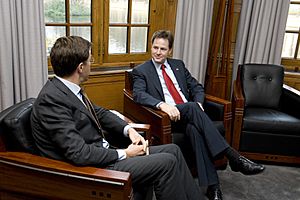
In July 2010, Clegg announced plans to reduce the number of MPs and hold a referendum on the voting system. The referendum, held in May 2011, asked voters if they wanted to use the "alternative vote" system. The proposal was defeated.
Clegg also confirmed plans for five-year fixed-term parliaments. This meant general elections would be held on a set date every five years. The Fixed-term Parliaments Act 2011 became law in September 2011.
A major issue was student tuition fees. Before the 2010 election, Liberal Democrat MPs, including Clegg, had promised to oppose any increase in fees. As part of the coalition agreement, the Liberal Democrats allowed an increase in fees. Clegg later apologized for making a promise they could not keep.
In October 2010, Clegg announced a "fairness premium" plan. This plan would provide extra support for the poorest students, including free nursery education for two-year-olds and a "pupil premium" for schools to help students from low-income families.
In June 2011, Clegg suggested a plan for ordinary people to own shares in Royal Bank of Scotland and Lloyds Banking Group. This would allow them to benefit if the banks' value increased after the government had helped them during the financial crisis.
In 2012, plans to reform the House of Lords were dropped. Clegg said the Conservatives had broken the coalition agreement by not supporting this policy. He later stated he would not take a seat in the House of Lords if it remained unreformed.
After Parliament (2015–Present)
Clegg kept his Sheffield Hallam seat in the 2015 election, but lost it in the 2017 election.
Brexit and European Union
In 2017, Clegg wrote a book called How to Stop Brexit (And Make Britain Great Again). He argued that leaving the European Union was not set in stone.
He joined others in calling for a "soft Brexit," meaning a closer relationship with the EU after leaving. In 2018, he attended a "People's Vote" march, supporting a public vote on the final Brexit deal.
Broadcasting and Media Work
From 2013 to 2015, Clegg hosted a weekly radio show called Call Clegg on LBC.
Between April and October 2018, he hosted a podcast called Anger Management with Nick Clegg. In this podcast, he interviewed well-known people about the politics of anger.
Work at Meta Platforms (Facebook)
In October 2018, Clegg was hired by Facebook, Inc. (now Meta Platforms) as Vice-President of Global Affairs and Communications. He said he joined because he believed the company's culture was changing and that lawmakers needed to discuss how data-intensive companies share information.
In 2020, Clegg helped create the Facebook Oversight Board, which reviews content decisions on the platform. He also played a role in Facebook's decision to remove former U.S. President Donald Trump from its platforms in 2021.
In February 2022, Clegg was promoted to President of Global Affairs at Meta. In January 2025, he announced he would step down from this role and leave Meta within a few months.
Personal Life
In September 2000, Clegg married Miriam González Durántez, a lawyer from Spain. They have three sons. While Clegg does not believe in God, his wife is Roman Catholic, and they are raising their children as Catholics. Clegg identifies as a feminist.
Clegg lives in Atherton, California, in the US. He previously lived in London and also has a house near the Peak District in the UK. In 2010, it was announced that he would share the use of Chevening, an official country residence, with the Foreign Secretary. In August 2022, Clegg announced he was moving back to London for personal reasons, splitting his time between London and California for work.
When he appeared on Desert Island Discs in 2010, his music choices included Johnny Cash, Prince, and Radiohead. He supports Arsenal F.C., a football club.
Honours
Clegg was appointed a Knight Bachelor in 2018 for his political and public service.
Styles and Titles
- Mr Nicholas William Peter Clegg (1967–1999)
- Mr Nicholas William Peter Clegg MEP (1999–2004)
- Mr Nicholas William Peter Clegg (2004–2005)
- Mr Nicholas William Peter Clegg MP (2005–2010)
- The Right Honourable Nicholas William Peter Clegg MP (2010–2017)
- The Right Honourable Nicholas William Peter Clegg (2017–2018)
- The Right Honourable Sir Nicholas William Peter Clegg (2018–present)
See also
 In Spanish: Nick Clegg para niños
In Spanish: Nick Clegg para niños
 | Laphonza Butler |
 | Daisy Bates |
 | Elizabeth Piper Ensley |


